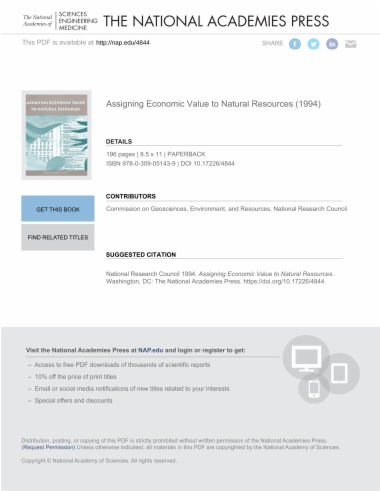There has been a lot of discussion among policymakers, particularly within the Clinton Administration, about how to make U.S. economic indicators, such as GNP, more accurately reflect the state of the environment. This book explores the major issues and controversies involved in incorporating natural resources and the environment into economic accounts. The first section of the volume, based largely on a three-day workshop of experts in the field, explains the possibilities and pitfalls in so-called "green" accounting. This is followed by a selection of nine individually authored papers, including one by Nobel prize winner Robert Solow, that probe scientific aspects of this issues in greater depth.
- Cover
- Front Matter
- Overview
- 1 An Almost Practical Step Toward Sustainability
- 2 What Can Policymakers Learn From Natural Resource Accounting?
- 3 The Feasibility of Incorporating Environmental and Natural Resource Availablility Into the National Accounts
- 4 Sustainable Resource Accounting
- 5 Transfer Models for Green Accounting: An Approach to Environmental Policy Analysis for Sustainable Development
- 6 Natural Resource and Environmental Accounting in U.S. Agriculture
- 7 Natural Resource Accounting for the Forestry Sector: Valuation Techniques and Policy Implications in Thailand
- 8 Soil Quality in Relation to Value and Sustainable Management
- 9 Valuing Biodiversity: An Application of Green Accounting
- Appendix: Workshop Planners and Participants

